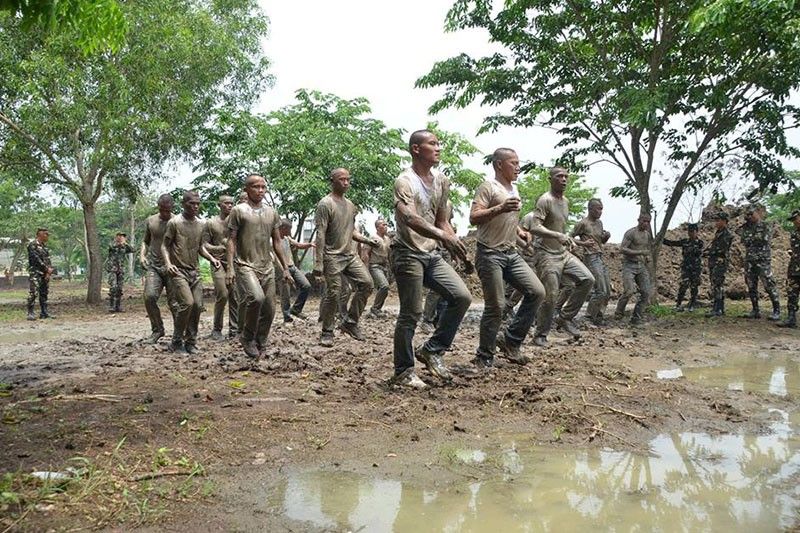Mandating military training in the Philippines for democratic citizenship

There is currently a legislative bill proposing mandatory military training among Filipino university students. Currently, the Reserve Officer Training Corps (ROTC) is only one of three mandatory national civic service options.
Because there are few opt-out options, the legislation essentially proposes to supplant the National Service Training Program (NSTP) which the majority of students currently take. This type of service is more community-oriented in the form of outreach programs to impoverished communities.
At the heart of the debate are competing visions of citizenship training necessary in a democratic republic.
The NSTP was enacted in 2001 after the old ROTC program for college-level Filipino males was abolished due to corruption and incidents of physical abuse by its instructors. The case not only for its revival but attempt to make the ROTC monopolize national service requirements in the Philippines is rather weak.
If the current administration genuinely aims to nurture democratic citizens, it should not revive a program with such ill history. Strengthening existing citizenship programs should be the goal.
Research in political psychology – the study of political behaviors and attitudes – can inform how governments create policies that can effectively nurture democratic citizens as envisaged by the country’s 1987 Constitution. It is important to pay close attention to what programs governments implement in developing politically participative citizens, especially during late adolescence and early adulthood as these are crucial phases of political socialization.
During these stages, citizens are more open to learning and imbibing political attitudes and beliefs that they are likely to carry with them through adulthood. This is known as the impressionable years hypothesis.
First, there is research on military training showing that it decreases authoritarianism but enhances social dominance orientation (SDO). SDO is a sociopolitical belief about group dominance and inequalities as being natural in society. People who possess this belief tend to be more prejudicial and discriminating of members of particular minorities or outgroups.
To be sure, military training and maintaining a force posture is a necessity of statecraft and national defense. But within the context of the Philippines, mandatory and universal military training is likely to crystallize the submission to hierarchies that the general population could use less of.
Based on its Gini coefficient, the Philippines is a highly unequal society and the population has historically harbored illiberal and non-democratic views such as preference for strongmen and distate for checks against balances against the executive. In a democratic context, it is not desirable to institutionalize a program with such a possible outcome among citizens.
Second, states vary in the policies and programs they set to cultivate good citizenship. Some mandate military training, while others provide alternative institutional citizen socialization opportunities. Globally, there are less than thirty states that require their citizens to undergo military training.
A senator supporting the proposed legislation argues that this military training will lead to a disciplined and more patriotic citizenry. Such claims lack supporting evidence.
Rather, as a form of citizen militarization, its institutionalization is likely to develop positive attitudes and beliefs about aggression, violence, and war. It will socialize citizens to war and war-like behaviors. Instead of compulsory ROTC, peace education programs are what they should implement.
With the global trends of democratic backsliding and rising of authoritarianism, the Philippines should reflect and rethink if re-institutionalizing compulsory military training will push back against these or reinforce them.
If one of the supposed goals for making ROTC required again is to improve formal political participation, lawmakers should first review how much the present NSTP program has fared in pursuing this goal.
NSTP as being more inclusive (not limited to male university students) and far-reaching (servicing minorities and underprivileged sectors), while still having a military-training option, appears to remain as a better program. These will be lost if they succeed in enacting mandatory ROTC.
The government should also build on other alternative platforms to nurture democratic citizens. Take the case of the existing Sangguniang Kabataan (Youth Councils) in local government units. The laws that implement this offer opportunities that should be maximized towards the Filipino youth’s effective political socialization in a democracy and proactive participation in formal political processes.
Citizen engagement in a democracy is not limited to just the realm of formal political institutions, nor to military formation. Aside from formal political participation, democratic citizens are likewise cultivated through engagement in civic organizations and activism. Many studies in political psychology attest to this.
The Philippine government should take stock of these to guide the design of their policies geared towards effectively nurturing democratic Filipino citizens. Acknowledging the value of various civic organizations, they should strengthen these and build partnerships towards developing more engaged citizens. Instead of being prejudiced against non-military forms of civic education, the government should recognize their role in realizing what democracy really is.
Diwa Malaya A. Quiñones is a faculty member at the Department of Psychology, University of the Philippines in Diliman.
- Latest

























